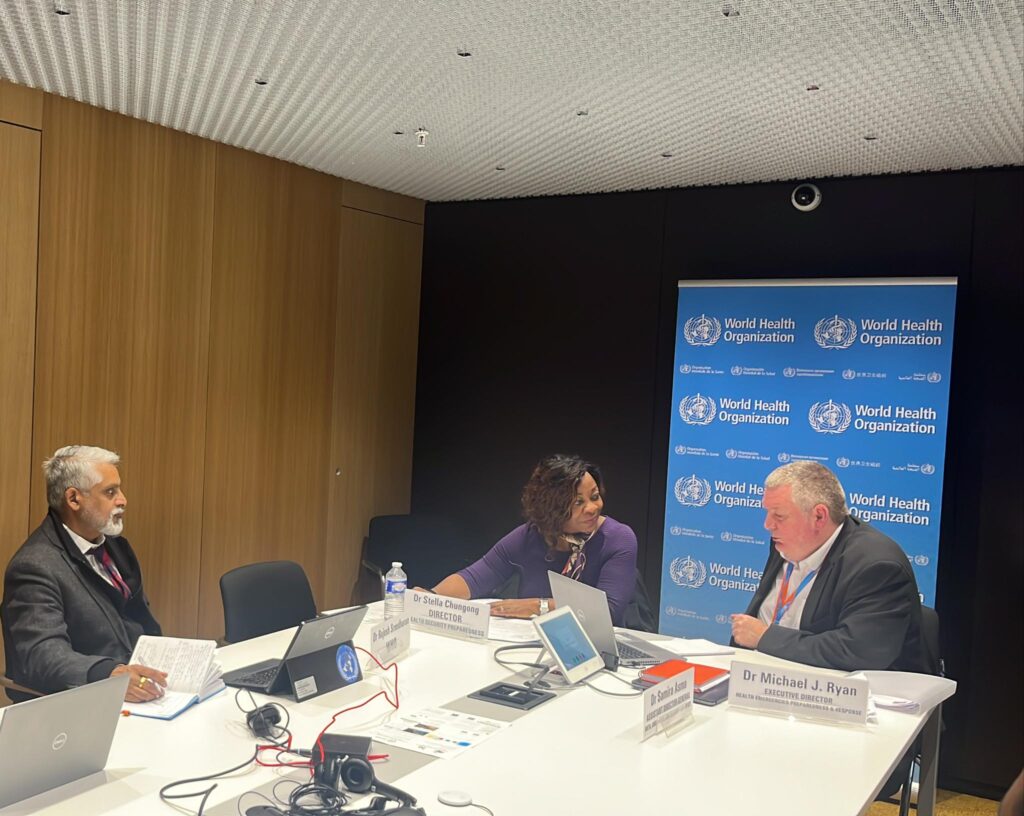23-27 January 2023: Series of public briefings and policy debates ahead of WHO EB 152, hosted by G2H2
In the week before the 152nd Session of the WHO Executive Board, a series of public policy debates and civil society strategy meetings organized by the Geneva Global Health Hub (G2H2) and its members provided spaces for sharing, assessing and debating health policy and governance challenges that go beyond the items covered by the formal agenda of WHO EB, bridging from health policies to people’s realities, addressing determinants of health and promoting democratic governance. The documentation of all sessions is available now on this website.
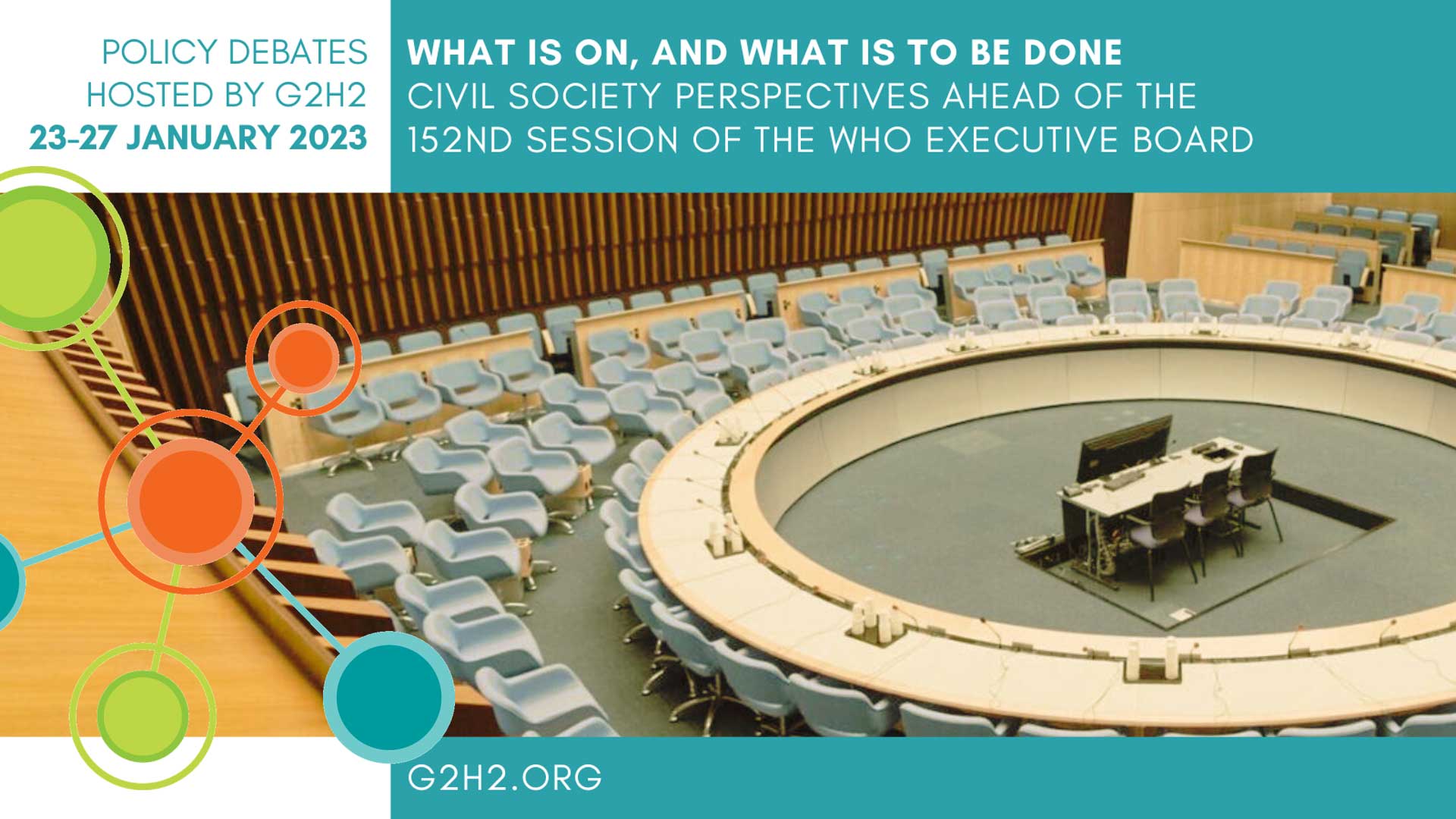
Programme
Monday 23 January 2023, 15.00-16.30 CET
Pandemic and Authoritarianism – the judgement of the Permanent Peoples’ Tribunal on President Jair Bolsonaro | Pandemia e autoritarismo: o armamento do Covid-19 no Brasil
Policy debate organized by Society for International Development (SID) and Permanent Peoples’ Tribunal (PPT). Languages: English and Portuguese
Debate de políticas públicas organizado pela Sociedade para o Desenvolvimento Internacional (SID) e Tribunal Permanente dos Povos (TPP). Línguas: Inglês e português
Tuesday 24 January 2023, 12.00-13.30 CET
The “Universal Health and Preparedness Review”: one year since the first briefing with civil society, what has happened and where are we going?
Briefing and policy dialogue organized by Save the Children and the WHO UHPR Secretariat. Language: English
Tuesday 24 January 2023, 15.00-16.30 CET
Moving together for universal access to healthcare? What to expect from a UN High Level Meeting on UHC and a related resolution of the WHO Executive Board?
Policy debate organized by MMI Network, People’s Health Movement, Save the Children and Wemos. Languages: English, French, Spanish
Thursday 26 January 2023, 13.00-14.30 CET
Advancing health equity for persons with disabilities and older people in the 2023 WHO and UN agendas
Policy debate organized by CBM, HelpAge International, Humanity & Inclusion, and Sightsavers on behalf of the International Disability in Development Consortium. Language: English. Accessibility: International Sign Language and Closed Captions (English)
Friday 27 January 2023, 15.00-1630 CET, Zoom webinar
“Common but differentiated responsibility”? Expectations related to the application of the CBDR principle in the field of international health and pandemic preparedness, prevention and response
Policy debate organized by Frontline AIDS, Medicus Mundi International Network (MMI) and Third World Network (TWN). Language: English
Documentation
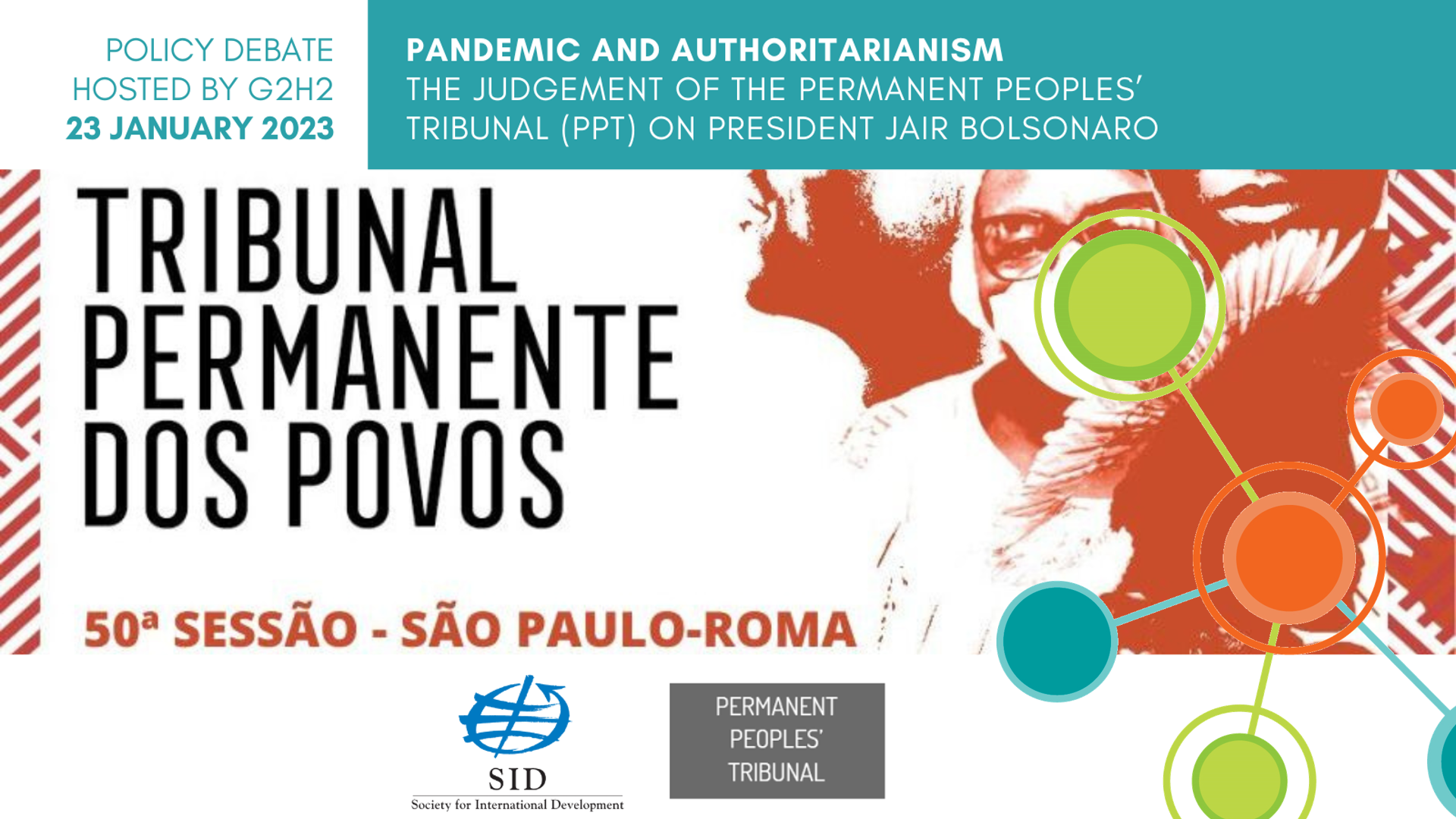
Monday 23 January 2023, 15.00-16.30 CET, Zoom webinar
Pandemic and Authoritarianism – the judgement of the Permanent Peoples’ Tribunal (PPT) on President Jair Bolsonaro | Pandemia e autoritarismo: o armamento do Covid-19 no Brasil
Anúncio em português: aqui (PDF)
Following the conclusion of the 50th session on Pandemic and Authoritarianism, held at the University of São Paulo’s, the Permanent Peoples’ Tribunal (PPT) issued a judgement last September which, based on witnesses and the voices of the Brazilian communities, has recognized President Jair Bolsonaro liable for serious crimes against humanity in relation to his management of Covid-19, and his political use of the pandemic against marginalized and indigenous populations. These strategies by the Brazilian president have resulted in the deaths of thousands of people. Upon request of the Arns Commission, the intervention of the PPT in Brazil, as well as creating a unique space for the voices of the affected communities, represents a very meaningful initiative for health justice to be pursued, and hopefully affirmed after the Covid crisis, at a time when the international community is trying to shape new binding tools for tackling future pandemics.
Addressing individual responsibilities of planned institutional violence via the existing means of international law is a concrete strategy to avoid repeating the gross human rights violations seen in the management of the Covid19 pandemic, not only in Brazil, by empowering communities and civil society groups affected in their sacrosanct quest for reparation.
Programme, speakers
- Gianni Tognoni, MD, Secretary of the Permanent People’s Tribunal (PPT)
- Eloisa Machado, Human Rights Lawyer and Arns Commission, Brazil
- Santiago Alcazar, Fiocruz Foundation, former head of the WHO delegation of Brazil
- Unni Karunakara, MD, Senior Fellow, The Global Health Justice Partnership, Yale Law School
Introduction and moderation by Nicoletta Dentico, director Global Health Justice Program, Society for International Development
Recording of the session
Media coverage
- Health Policy Watch, 24 January 2023
Brazil to Call for Protection of Indigenous People’s Health After Bolsonaro ‘Abandonment’ During COVID-19
References
- Website of the Permanent People’s Tribunal
http://permanentpeoplestribunal.org/?lang=en - Presentation of the Permanent People’s Tribunal
https://en.wikipedia.org/wiki/Permanent_Peoples%27_Tribunal - PPT session documentation
Text of the judgement: Portuguese
Indictment: English – Portuguese
Judgement reading event: English – Portuguese
Session of May 23, 2022: English – Portuguese
Session of May 24, 2022: English – Portuguese
Session of May 25, 2022: English – Portuguese
More about this session
- Public policy debate organized by Society for International Development (SID) and Permanent Peoples’ Tribunal (PPT)
- Language(s): English and Portuguese
- Contact: Nicoletta Dentico, Society for International Development
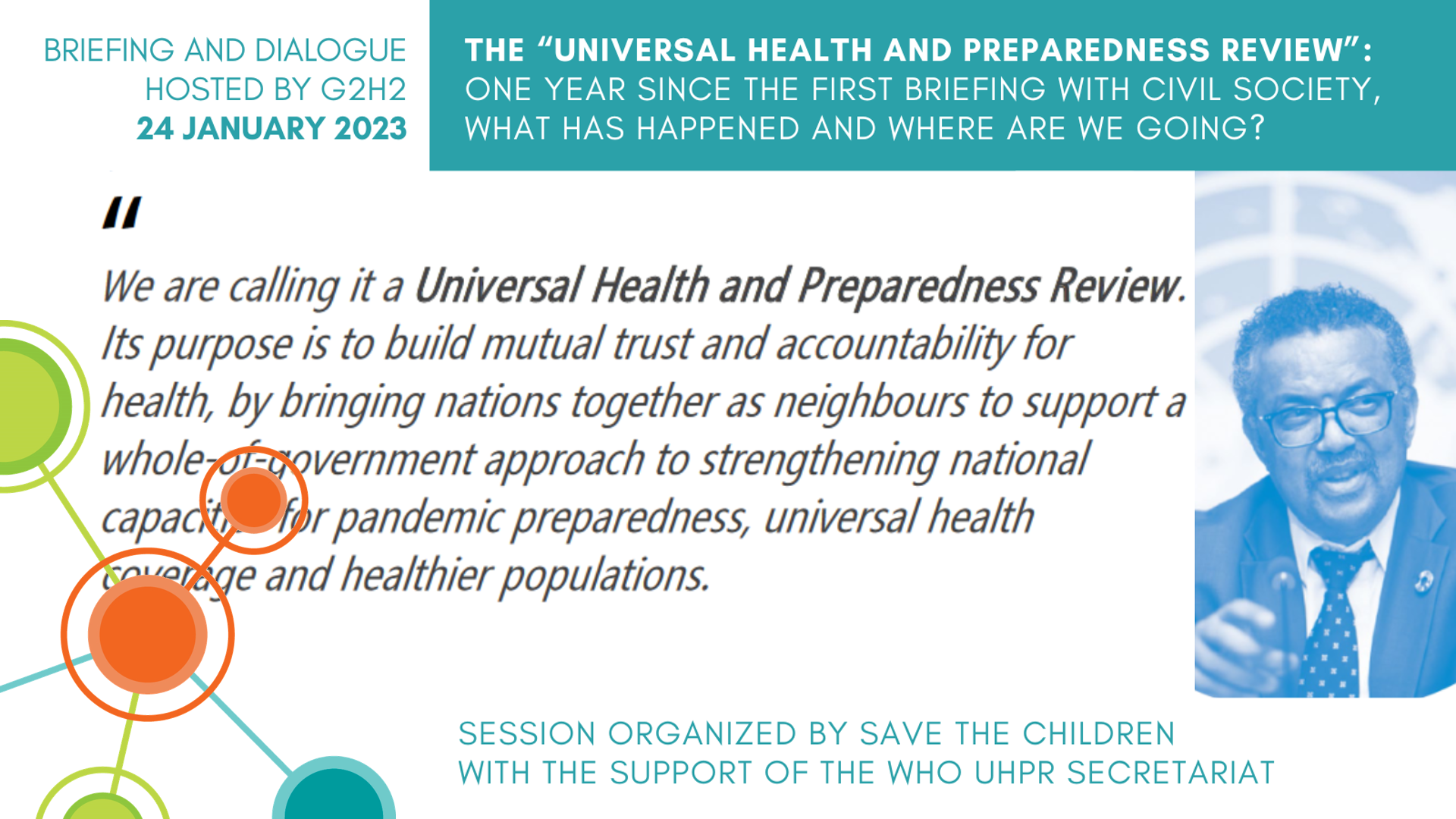
Tuesday 24 January 2023, 12.00-13.30 CET, Zoom webinar
The “Universal Health and Preparedness Review”: one year since the first briefing with civil society, what has happened and where are we going?
In January 2022, Save the Children organized a first briefing on the Universal Health and Preparedness Review (UHPR), as part of the G2H2 public policy debate series, to discuss options for the engagement of civil society in a new peer-review mechanism for public health. One year later, four countries (Central African Republic, Iraq, Thailand and Portugal) have undergone pilots, a Technical Advisory Group has been established and notably tasked with providing advice on defining the contours of civil society participation in the UHPR, and WHO has been working with Member States to build support for the mechanism – gathering country experiences and developing proposals for UHPR modalities.
So how far are WHO and Member States in the thinking around social participation in the Universal Health and Preparedness Review and what will be the opportunities this year to further contribute to the design of the UHPR? This second briefing will provide an update on what has been achieved in 2022 and an opportunity for a dialogue with civil society organizations on next steps towards the Universal Health and Preparedness Review mechanism. It will provide an opportunity to hear from WHO on plans for engagement and consultation with civil society in 2023, and also a chance to discuss and give feedback on a draft “guide for engaging social participation stakeholders as part of their UHPR national reporting process” developed by WHO.
Programme, speakers
- Welcome
Michel Anglade, Save the Children
- Opening remarks
Mike Ryan, Executive Director, WHO Health Emergencies Programme
- Update from WHO on 2022 UHPR Progress
Stella Chungong, Director, Health Security Preparedness, WHO - Update on civil society engagement in UHPR
Justin Koonin, UHC2030 Co-Chair and UHPR TAG member - Discussion
- Closing
Samira Asma, Assistant Director-General, Data, Analytics and Delivery for Impact Division, WHO
Session documentation
- Zoom cloud recording here
- WHO session slides: PPT as PDF
References
- WHO website: Universal Health & Preparedness Review
- WHO website: UHPR – Frequently Asked Questions
Consultation on social participation guide
- The WHO UHPR Secretariat has shared the document “Social Participation – Guide for Member States undertaking the UHPR National Reporting process” that was further introduced by the WHO team during the session. WHO welcomes feedback on this draft paper from Civil Society Organizations in writing to UHPR@who.int until 31 January 2023 (extended deadline).
More about this session
- Briefing and policy dialogue organized by Save the Children and WHO UHPR Secretariat
- Language: English
- Contact: Margot Nauleau, Save the Children
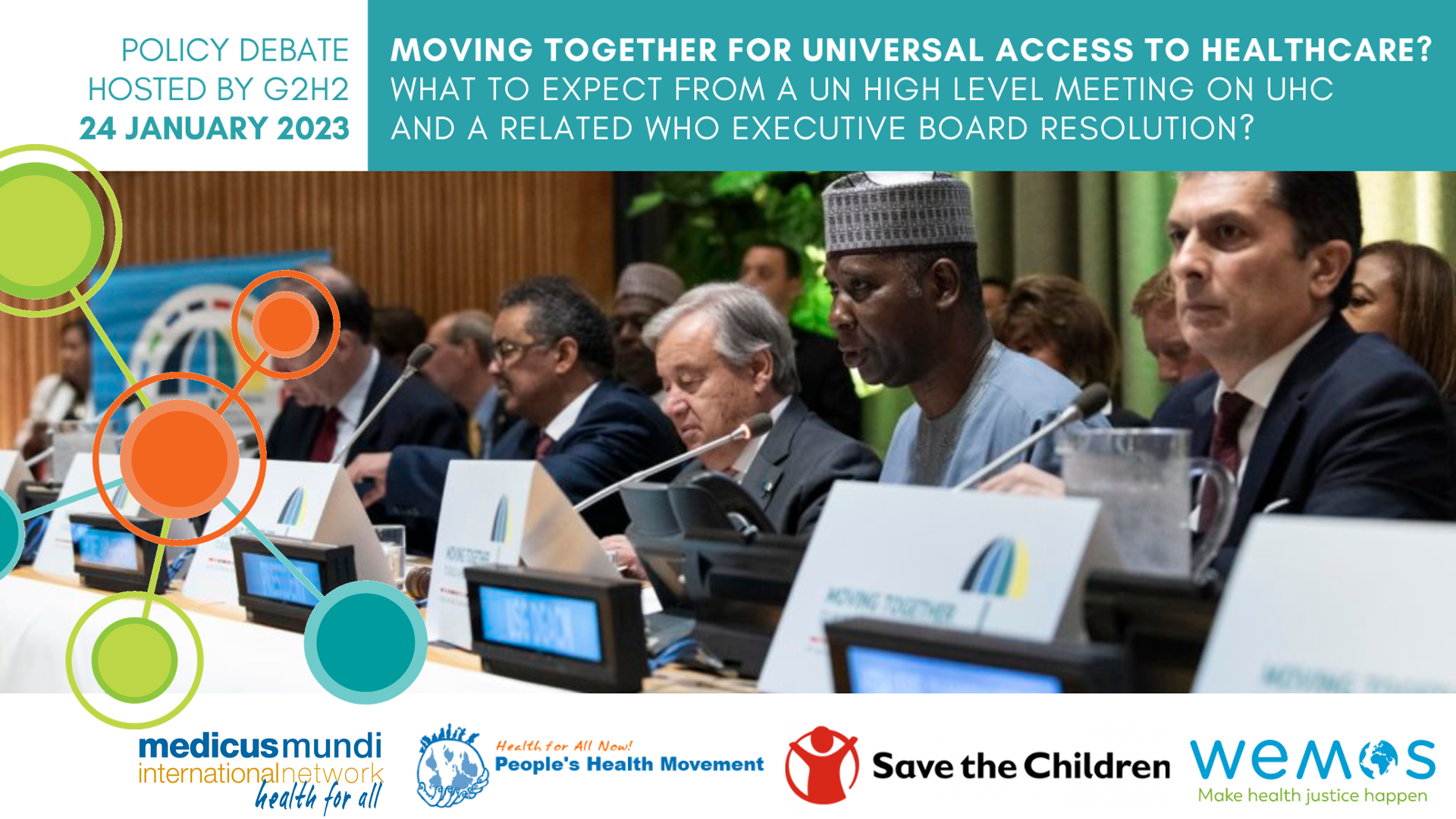
Tuesday 24 January 2023, 15.00-16.30 CET, Zoom webinar
Moving together for universal access to healthcare? What to expect from a UN High Level Meeting on UHC and a related resolution of the WHO Executive Board?
In the political declaration of the 2019 UN High-Level Meeting (UN HLM) on Universal Health Coverage “Moving Together to Build a Healthier World”, world leaders committed for all people to have access to quality essential health services and quality, safe, effective, affordable, and essential medicines, vaccines, diagnostics, and health technologies, without experiencing financial hardship and without discrimination by 2030.
At the time, a number of civil society organizations criticised the political declaration which was considered a weak and unspecific wish-list that would not lead to any substantive change in people’s access to healthcare. Four years later, the World Health Organization and governments prepare for another UN HLM on UHC and a related World Health Assembly resolution. But the reality is dire: we have not “moved together” and the world is certainly not healthier. The COVID-19 pandemic has further weakened health systems and it has revealed the consequences of deep inequities, economic and financial injustice, commercialisation of healthcare, and the lack of solidarity and international action.
More specifically, according to the 2021 global monitoring report “Tracking universal health coverage”, some progress made in service coverage over the past 20 years has been in part offset by the COVID-19 pandemic while the targets regarding reducing financial hardship are far from being achieved. According to WHO, “although the majority of countries recognize universal health coverage as a goal that is reflected in laws and national plans, a lack of concrete operational steps coupled with inadequate public financing for health are pushing progress towards relevant targets for 2030 further off track.” (document EB152/5)
Anyhow, ambitions remain high. WHO wants to use the “opportunity afforded by WHO’s 75th anniversary in 2023 to inspire and catalyse additional multisectoral, multilateral action by governments and all relevant stakeholders towards the progressive realization of universal health coverage and health for all” (document EB152/5). And, in early 2023, UHC2030 launched an online consultation process on a proposed “Action Agenda from the UHC Movement”.
Programme
- Welcome
- Update on the state of preparations for the 2023 high-level meeting of the United Nations General Assembly on universal health coverage
Viroj Tangchaorensathien, Senior Advisor International health policy program, Thailand
Shyama Kuruvilla, Senior Strategic Advisor UHC and Life Course, WHO Secretariat
…talking with Thomas Schwarz, Medicus Mundi International Network - Civil society panel and discussion on key documents by WHO and UHC2030:
How to make sense and use of the 2023 diplomacy on UHC?
Manuj C Weerasinghe, University of Colombo, PHM Steering Council
Dumi Gatsha, Success Capital, UHC2030 UN HLM Task Force, UHC2030 Steering Committee
Eliana Monteforte, Global Health Council, CSEM Advisory Group
…moderated by Barbara Fienieg, Wemos - Outlook and closure
Session doumentation
- Zoom cloud recording: here
References
- Preparing for the UN High-level meeting 2023 and achieving Health for All
WHO website - Preparing for the UN High-level meeting 2023 and achieving Health for All
Updated presentation by WHO Secretariat, January 2023 - WHO Executive Board: Document EB152/5
Reorienting health systems to primary health care as a resilient foundation for universal health coverage and preparations for a high-level meeting of the United Nations General Assembly on universal health coverage. Report by the WHO DG - Draft Action Agenda from the UHC Movement
UHC2030 UN High-Level Meeting 2023 Task Force, January 2023.
Informal copy taken from the online consultation - Tracking universal health coverage
2021 global monitoring report - Universal health coverage: moving together to build a healthier world
Political Declaration of the 2019 High-level Meeting on Universal Health Coverage - A civil society assessment of the political declaration of the UN High Level
PHM, PIH, Sama, MMI and PSI, 2019
More about this session
- Policy debate organized by MMI Network, People’s Health Movement, Save the Children and Wemos
- Languages: English, French, Spanish
- Contact: Thomas Schwarz
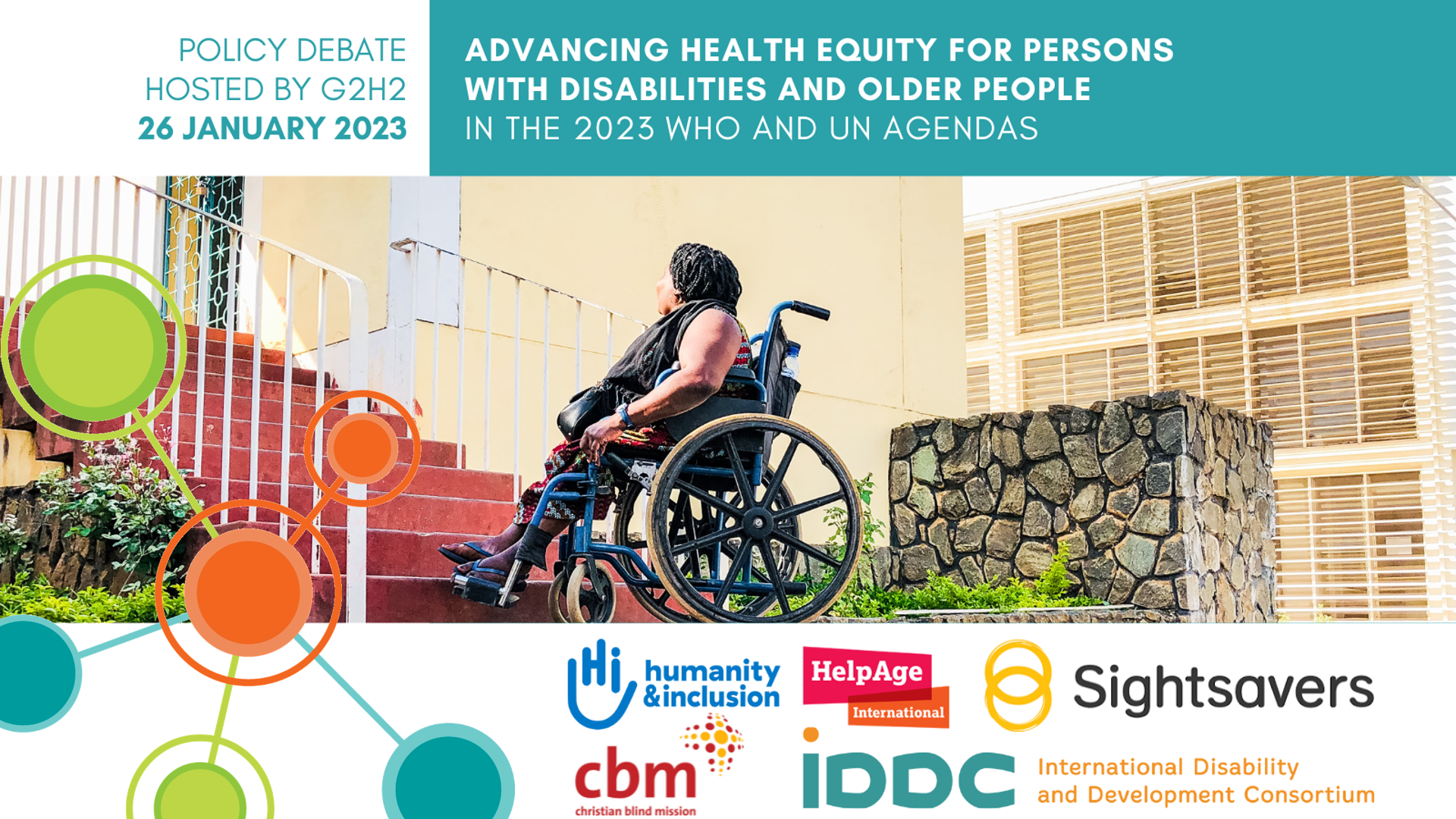
Thursday 26 January 2023, 13.00-14.30 CET, Zoom webinar
Advancing health equity for persons with disabilities and older people in the 2023 WHO and UN agendas
An estimated 1.3 billion people globally – around 16% of the world’s population – experience significant disability, and by 2030 there will be an estimated 1.4 billion people aged 60 or over, and these figures are set to rise over the coming decades as a consequence of changing patterns of disease and disability and population ageing.
This policy dialogue will consider the significance of a number of items on the agenda of the forthcoming meeting of the WHO Executive Board and the 76th World Health Assembly and emerging priorities for the 2023 UN High-Level Meetings on Universal Health Coverage and on pandemic prevention that are important for advancing health equity for people with disabilities and older people. It will seek to highlight opportunities for strengthening action and commitments on age and disability equity and inclusion through these interconnected processes.
Programme
- Welcome
Sarah Collinson, Health Policy Adviser at Sightsavers, a member of the Inclusive Health Task Group of the International Disability in Development Alliance - Keynote
Jarrod Clyne, Human Rights Advisor for the Human Rights Council, International Disability Alliance - Representatives of Member State Permanent Missions: Ensuring that persons with disabilities and older people are not left behind in UHC
Peace Masinde-Mutuma, Permanent Mission of the Republic of Kenya to the UN
Brian Frenkel, Permanent Mission of Israel to the UN - Priorities for advancing health equity for persons with disabilities and older people
Darryl Barrett, Technical Lead (Disability), Sensory Functions, Disability and Rehabilitation Team, WHO
Yuka Sumi, Acting Unit Head and Medical Officer, Ageing and Health Team, WHO - Civil society panel: opportunities to strengthen action and commitments on age and disability inclusion and health equity through the 2023 WHA and UN agendas:
Smitha Sadasivan, Member of the UHC2030 Steering Committee & CSEM Advisory Group
Gertrude Oforiwa Fefoame, Member of the Committee on the Rights of Persons with Disabilities & Global Advocacy Manager for Social Inclusion, Sightsavers
Caitlin Littleton, Portfolio Lead Healthy Ageing, HelpAge International
Grace Dubois, Policy and Research Manager, NCD Alliance
Moderator: Alessandra Aresu, Director, Global Inclusive Health Division, Humanity & Inclusion, and Co-Chair of the IDDC Inclusive Health Task Group - Q&A / plenary discussion
- Closing remarks
Miriam Maier, Advocacy Officer, Christian Blind Mission
Session recording
Further references
- WHO Secretariat input to this session: PPT presentation as PDF
- Document EB152/23, Report of the Director-General: The highest attainable standard of health for persons with disabilities
- Document EB152/52, Report of the Director-General: Implementation of the United Nations Disability Inclusion Strategy, including the WHO policy on disability
- WHO Global Report on Health Equity for Persons with Disabilities (2022)
- WHO website: UN Decade of Health Ageing
- HelpAge International: Achieving Universal Health Coverage fit for an ageing world
More about this session
- Policy debate organized by CBM, HelpAge International, Humanity & Inclusion, and Sightsavers on behalf of the International Disability in Development Consortium
- Language: English
- Accessibility: International Sign Language and Closed Captions (English)
- Contact: Sarah Collinson, Sightsavers
- Register here (Zoom) for all public sessions
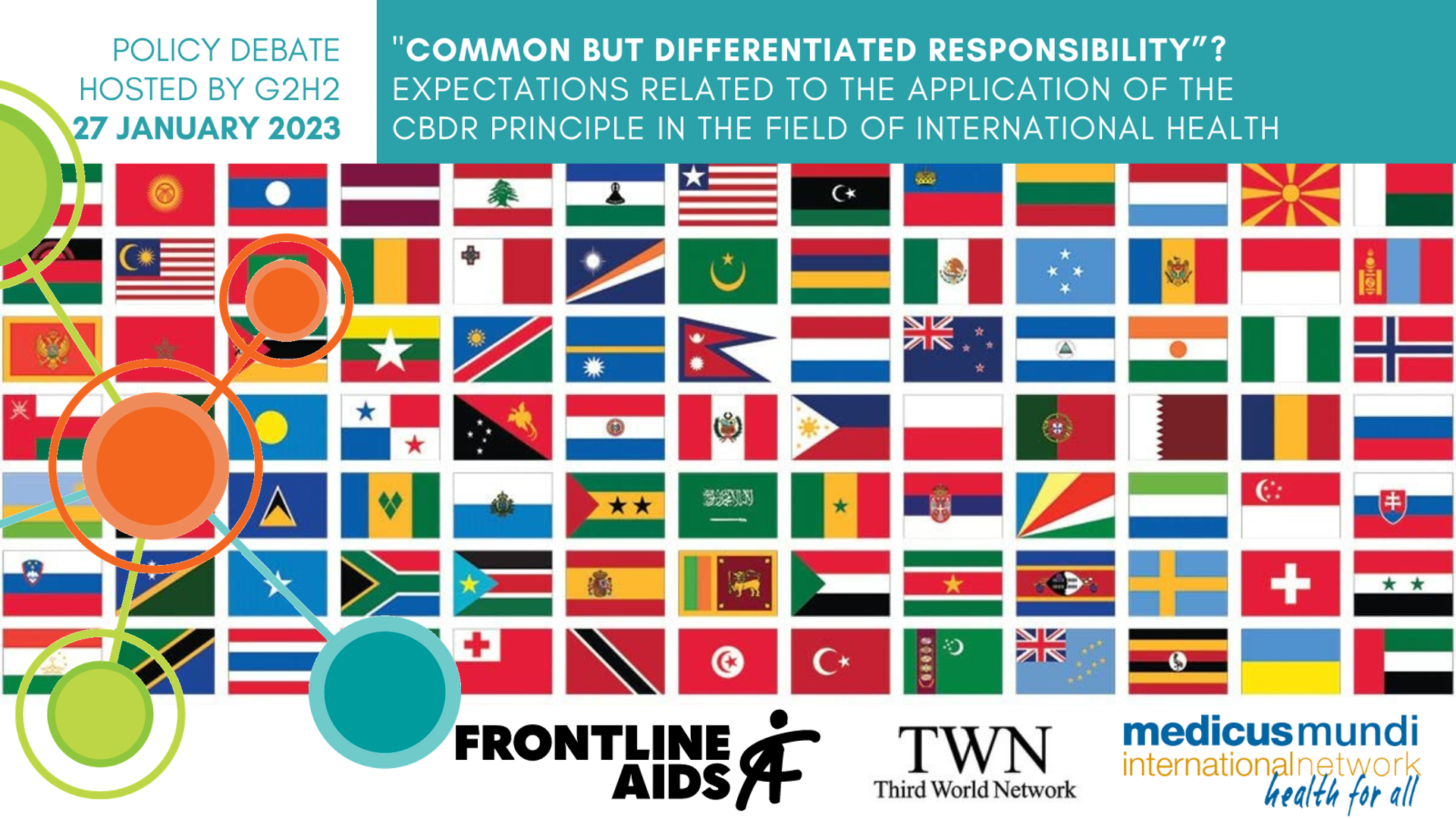
Friday 27 January 2023, 15.00-16.30 CET, Zoom webinar
“Common but differentiated responsibility”? Expectations related to the application of the CBDR principle in the field of international health and pandemic preparedness, prevention and response
The 1992 United Nations Framework Convention on Climate Change formalized, for the first time, the essential compromise between the global North and South, wherein the richer industrialized nations agreed to undertake higher obligations to combat environmental challenges. This agreement was further developed into a system of caps on carbon emissions in the Kyoto Protocol. This is called the Common But Differentiated Responsibility (CBDR), which is now also finding applications beyond international environment law in various naval treaties and trade agreements (reference).
Based on the initiative of some countries of the global South, the concept of CBDR has made its way into the “conceptual zero draft” of a new WHO convention, agreement or other international instrument on pandemic prevention, preparedness and response (INB, “pandemic treaty” process). The policy dialogue shall allow participants to explore and debate the use of the principle of common but differentiated responsibilities and related capabilities in the field of international health law, and the proposed pandemic treaty.
Programme
- Welcome, introduction
Eolann Mac Fadden, Frontline AIDS - The concept of CBDR and its applicability to international health law
Vicente Paulo Yu, International Climate Law Expert, & G77 Coordinator, UN Framework Convention on Climate Change
Matiangai Sirleaf, Nathan Patz Professor of Law at the University of Maryland School of Law
Nirmalya Syam, Senior Programme Officer, South Centre
KM Gopakumar, legal advisor and senior researcher, Third World Network - Discussion (panel and plenary)
Is it (legally) possible to introduce/apply the CBDR principle in a WHO instrument?
Does it (conceptually) make sense to do so? Relevance and advantages?
Is it (practically, politically) feasible/wise to do so? - Outlook and closure
Session moderated by Priti Patnaik, Geneva Health Files
Session documentation
- Session recording: Zoom cloud
- Input by Vicente Paulo Yu: CBDR and Equity in the Pandemic Treaty
References
Responsibility and CBDR in epidemics
- Responsibility for Epidemics
Matiangai Sirleaf, 2018 - Africa, COVID-19 and Responsibility
Matiangai Sirleaf, 2020 - Adapting Common But Differentiated Responsibility to the Global Cooperation for COVID-19 Response
Abhinav Verma, JIA 2020 - WHO: Developed countries oppose CBDR inclusion in new pandemic instrument
Nithin Ramakrishnan, TWN Info 2022 - Common but Differentiated Responsibilities and Respective Capabilities as a Guiding Principle in International Health Law in Times of Pandemics
Chenguang Wang & Yi Zhang, Springer 2022 (gated)
CBDR principle: Origins and Scope
- The Principle of Common But Differentiated Responsibilities: Origins and Scope
CISDL brief, 2002 - Differential Treatment in International Law & Global Risks from Pandemics and Climate Change
- Bradly J. Condon 2022 via SSRN
(WTO context: “special and differential treatment provisions”) - Rio+20: “Common but differentiated responsibilities” debate takes a turn
TWN Rio+20 Update, 2022 - Different Perspectives on Differentiated Responsibilities
Pieter Pauw et al. IDOS 2014
More about this session
- Policy debate organized by Frontline AIDS, Medicus Mundi International Network (MMI), and Third World Network (TWN)
- Language: English
- Contact: Thomas Schwarz, MMI Network
G2H2 members meetings
Wednesday 25 January 2023, 15.00-17.00 CET, as Zoom meeting
Multistakeholderism and health rights: implications for global health governance and the role of civil society
The culture of multistakeholderism, and its political implementation as the one inspirational model to follow in policymaking across all sectors, stands out today as a powerful vision that shapes governance frameworks and policy options at all decision levels – from local to international. This vision – successfully brokered by a few Western governments in alliance with a group of philanthropic and economic players at the end of the ‘90s- was pioneered in the health arena, where it has asserted itself as the driving force in the shaping of health strategies and institutions over the last two decades, with the blessing of the World Health Organization.
Multistakeholderism in health covers a complex range of modalities. Some multistakeholder initiatives are primarily policy-oriented, including with the creation of new governance players like Gavi. Others may be product and process-oriented, as is the case of the Medicines Patent Pool. Some may have a project-oriented purpose, in the guise of public-private partnerships, as in the case of Drugs for Neglected Diseases Initiative (DNDi). It must be recognized, though, that these boundaries are increasingly difficult to draw, as a new health governance arena is gradually unfolding. The Covid-19 pandemic has further accelerated this process.
The G2H2 workshop builds on a lively internal debate concerning multistakeholderism among members and aims to create a space for advancing a constructive dialogue between different and diverging views within the G2H2 constituency. The webinar provides the possibility of analyzing the diverse modalities in which multistakeholderism is operationalized as well as shaping the route for further G2H2 work on this arena, a necessary step now that the platform is engaged as a “relevant stakeholder” in the process leading to a pandemic treaty at the WHO. The webinar will develop along the following elements ands questions:
- Multistakeholder governance and the leverage of a powerful vision
- Multistakeholderism: What are we talking about?
- Health rights in the trap of corporate capture?
- The fascination of partnering: Civil society in multistakeholder governance
- Dealing with a multistakeholder WHO: tensions and ways forward for G2H2
Internal G2H2 strategy workshop. Contact: G2H2 Secretariat
Registration info have been communicated to G2H2 members
Sunday, 29 January 2023, 15.00-18.00 CET, Geneva/hybrid
G2H2: Building an independent civil society voice for global health that places people’s rights at the centre
“Now more than ever, public interest civil society organisations need to stand up and speak out as vocally as they can for the kind of world we want and deserve. There is a generalised public appreciation of the need for far-reaching steps to be taken by governments and the multilateral system to address this syndemic crises. But the forces that benefit from the current state of affairs are entrenched. We need robust advocacy, and evidence-based campaigns to effectively influence public opinion with evidence and contribute to a post-COVID-19 world where “building back better” means putting people and the commons, such as universal healthcare and public health services, first.” (quoted from the G2H2 2021-2022 advocacy platform, to be revisited)
G2H2 members meeting. Contact: G2H2 Secretariat
Registration info have been communicated to G2H2 members
EB TODAY
In the week of the WHO Executive Board meeting
“EB TODAY”, 30 January to 7 February 2023
During the governing body meetings of the World Health Organization, the People’s Health Movement (PHM), the Medicus Mundi International Network (MMI) and the Geneva Global Health Hub (G2H2) jointly host a daily civil society lounge. Join us for assessments of what’s on at the WHO EB and what needs the attention and engagement of civil society.
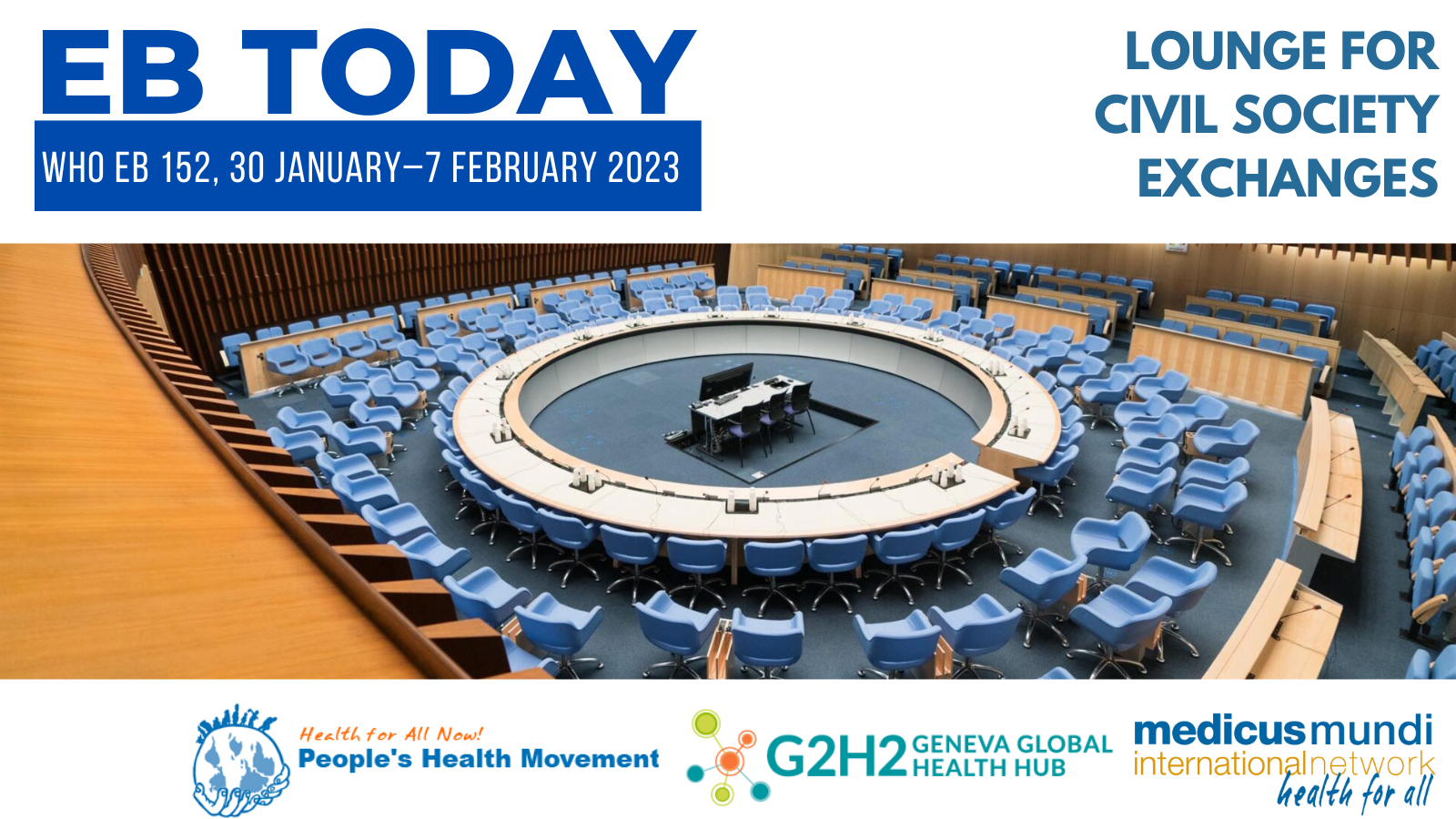
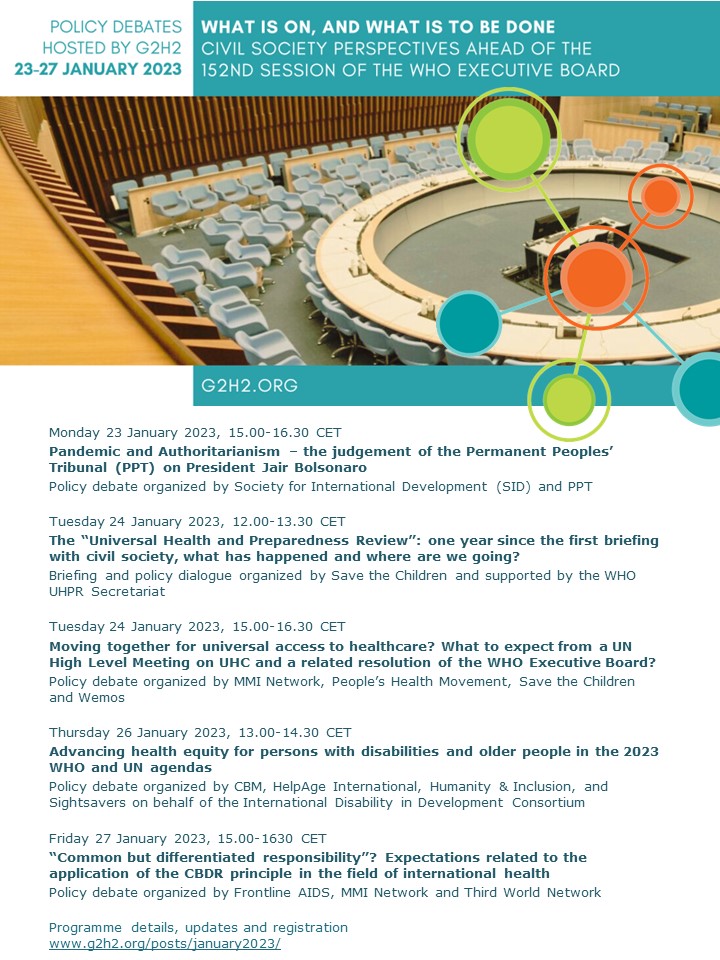
For general enquiries, please get in touch with the G2H2 secretariat. Thank you!

